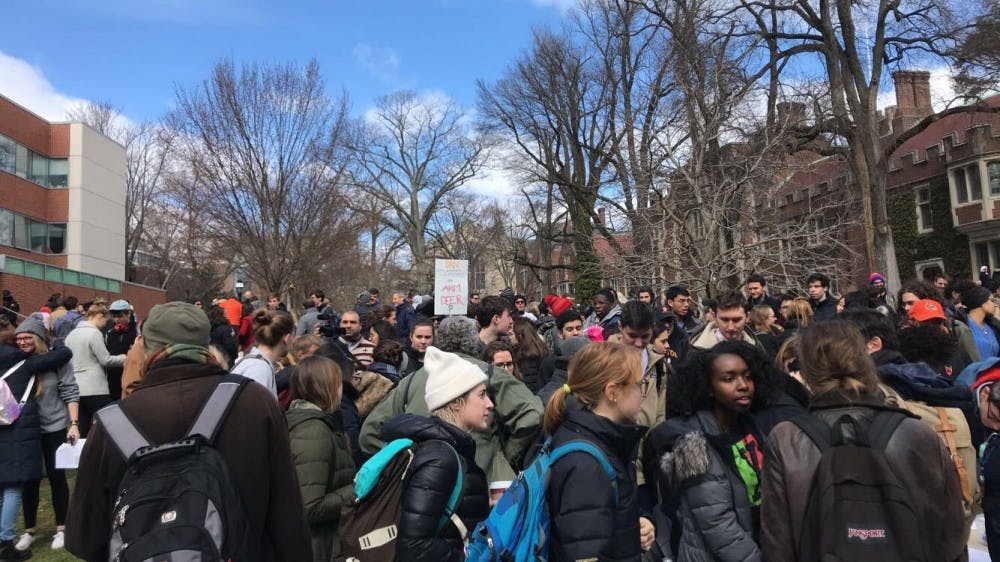Content Warning: The following column contains descriptions of gun violence. To speak with Counseling and Psychological Services, please call (609) 258-3141.
The following is a guest contribution and reflects the authors’ views alone. For information on how to submit an article to the Opinion Section, click here.
In her recent column on gun violence, columnist Andi Grene remarked, “We are no longer K-12 students, and are therefore no longer the most common targets [of school shooters] … We are both too young and too old to find ourselves equipped with the necessary sense of urgency [to combat gun violence].” We agree that apathy towards gun violence must be combatted, but Grene’s belief that college students are “too old” to feel the urgency of gun violence is reductive.
Given the current state of gun violence in the United States, we find it difficult to believe that any person could fully remove themselves from gun violence or its related trauma. We have to place the blame where it belongs: disillusionment due to a lack of action, desensitization to gun deaths, and collective trauma.
From homicides to unintentional shootings to suicides, an average of 316 people are shot every day in the United States. Gun violence affects some groups disproportionately: Black Americans are more likely to be victims of gun violence than white Americans. Additionally, Black Americans are three times more likely to be shot by police than any other population.
The issue of gun violence does not pass college students by. Outside of school shootings on college campuses — which do occur — young adults are at risk of being shot in malls, movie theaters, grocery stores, clubs, and so many other places where senseless gun violence has occurred over the last two decades. In today’s America, no one is too young or too old to be a potential victim.
For every stage in our lives, there is some memory of gun violence from the news burned into our minds: Sandy Hook, Pulse, Parkland, Virginia Tech. For some young people, America’s gun violence problem has them questioning their futures: Should they have children? Is it safer for them to move abroad? To imply that gun violence is an issue that we have outgrown dangerously ignores its continuous impact on our mental health and our perceived safety within the spaces we inhabit.
The argument that students are apathetic about school shootings because of their age also disregards the fact that many college students and young adults are survivors of gun violence. This includes community members at Princeton. Our peers have connections and communal ties to shootings all over the country, including the Tree of Life Synagogue shooting in 2018 and the STEM School Shooting in 2019.

On Valentine’s Day, it will be four years since the Parkland shooting and the ensuing March For Our Lives nationwide youth protest movement. But despite tireless advocacy by our generational peers, in these past four years, no substantive piece of gun sense legislation has been passed by Congress.
We are tired that calls for the protection of life through common sense gun laws continue to be met with silence and political bickering. Additionally, research shows that children and teens face desentization to gun violence after media exposure, which can have lasting effects on their mental health. In the age of digital activism and being bombarded by news and media 24/7, these trauma responses are necessary to continue to function on the daily.
Despite this desensitization and the lack of concrete implementation of gun control at the federal level, many groups of survivors, family members, and community members continue to lead and work for anti-gun violence organizations, such as March For Our Lives, Everytown for Gun Safety and the Koshka Foundation. On campus, Princeton Against Gun Violence exists to foster conversations on gun violence, celebrate victories at the state and local level, provide a safe space to process the grief of gun violence, and organize in response.
Putting all of the emotional labor onto victims or those who have been traumatized is not only unsustainable for a movement but also unfair to those who are screaming into the void advocating for greater gun control. In a society where so many are traumatized by gun violence and the barriers to change are so great, no one individual can be blamed for lack of action.

There is no outgrowing gun violence — it is unfortunately an ever present reality that has the potential to affect any of us at any stage in our lives. In spite of the continuous setbacks to concrete federal reform, we cannot stop fighting for comprehensive gun sense laws because, whether we like it or not, gun violence is an inescapable reality that affects us all.
All our fellow students should grant themselves the space to process any emotions they may feel towards gun violence and to continue to advocate towards its reduction. Whether by joining Everytown’s mailing list and signing on to their numerous letters to Congress, donating to the aforementioned organizations, joining anti-gun violence groups on campus, or going to a protest or voting for pro-gun control politicians, there is something each of us can do to decry gun violence’s pervasive and looming presence in our lives.
Rooya Rahin is a junior from Highlands Ranch, Colo. concentrating in Politics. She is the Chair of the 146th Editorial Board of The Daily Princetonian. You can reach her at rrahin@princeton.edu.
Ana Blanco is a junior from Miami, Fla. concentrating in the School of Public and International Affairs. She is co-president of Princeton Against Gun Violence. You can reach her at ab53@princeton.edu.
Julia Elman is a junior from Arlington, Va. concentrating in the School of Public and International Affairs. She is co-president of Princeton Against Gun Violence. You can reach her at jelman@princeton.edu.








